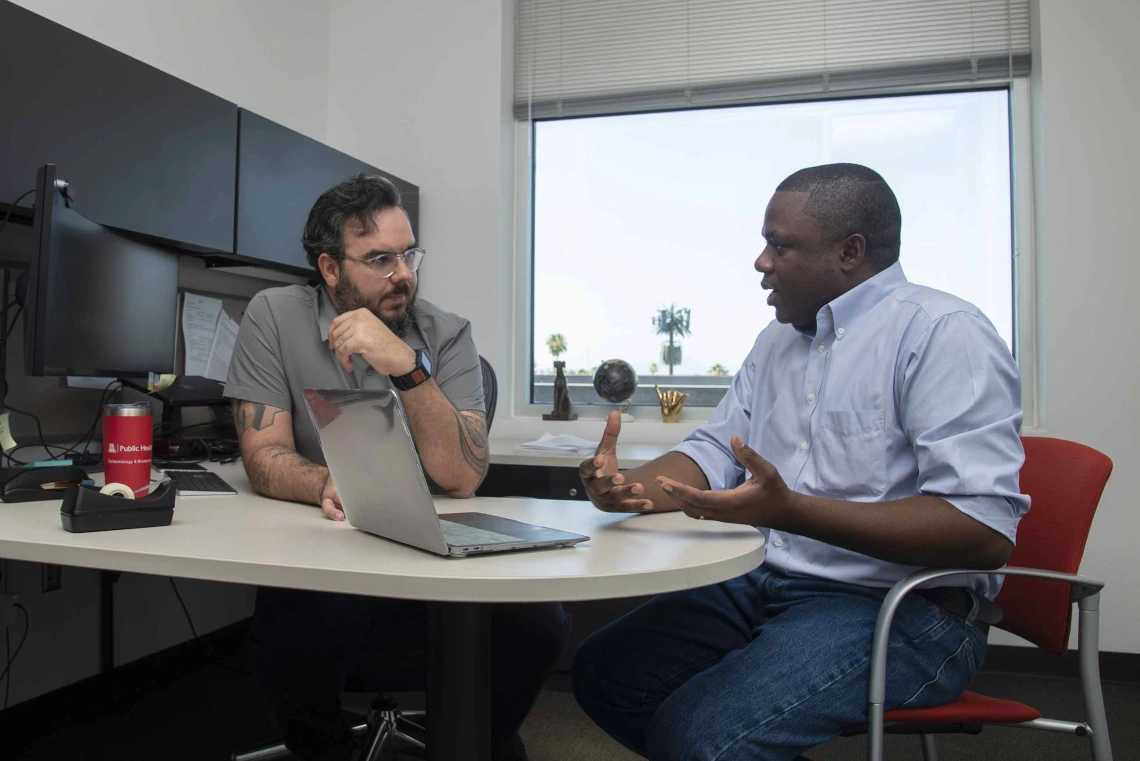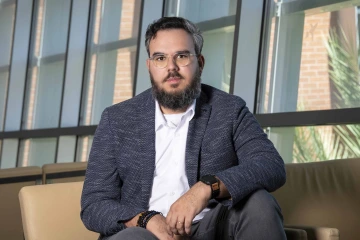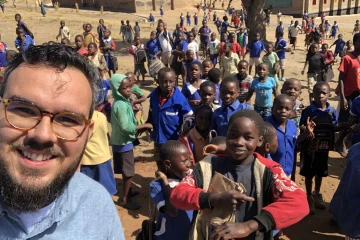Public Health scientist leverages evolving technology to track diseases
Inspired by 19th century physician, Onicio Leal Neto brings 21st century digital epidemiology to U of A with far-reaching, global impacts.

Digital epidemiologist Onicio Leal Neto, PhD, MPH, came to the University of Arizona in December and looks forward to teaching public health students about using emerging technology in the field.
Photo by Noelle Haro-Gomez, UArizona Health Sciences Office of Communications
First things first: Onicio Leal Neto, PhD, MPH, is no “Game of Thrones” fan.
So, when he says John Snow is his hero, he does not mean the fictional Jon Snow, born Aegon Targaryen, son of Lyanna Stark and Rhaegar Targaryen, the late Prince of Dragonstone.

As a startup founder and public health researcher, Onicio Leal Neto, PhD, MPH, has been at the forefront of mixing technology with disease detection.
Photo by Noelle Haro-Gomez, UArizona Health Sciences Office of Communications
Leal Neto, an assistant research professor of digital epidemiology at the University of Arizona’s Mel and Enid Zuckerman College of Public Health, is dismayed at how the faux Snow from the eight-season, HBO fantasy drama has overwhelmed the Google search engine.
“Before ‘Game of Thrones,’ if you typed in ‘John Snow’ on Google, you got the real one, the one who is the father of modern epidemiology. But after ‘Game of Thrones…’” Leal Neto said, his voice trailing off. He smiled and shook his head.
Not so much anymore.
The real John Snow, a 19th century English physician, is known for his groundbreaking work using maps and records to track the source of a London cholera outbreak to a contaminated drinking water pump. This led to fundamental changes in the city’s water and waste systems that spurred similar innovations in other countries that improved public health around the world.
Much like his historic hero, Leal Neto is driving epidemiology forward with innovation. In Leal Neto’s case, it’s cutting-edge technology in the emerging field of digital epidemiology, using smartphones, mobile apps and wearable electronic devices to track, prevent and stop diseases from spreading. The field is so fresh that few schools are teaching it.
“It’s an opportunity to grow this new area and train the next generation of public health professionals,” he said.
Starting from scratch
Leal Neto arrived in Tucson in December with his wife, two daughters and nine suitcases. The family relocated from Zurich, Switzerland, where he was a senior researcher in computer science. At the Zuckerman College of Public Health, Leal Neto will oversee the digital disease surveillance platform Global Flu View, a program he helped create as part of the nonprofit Ending Pandemics team led by Mark Smolinski, MD, MPH, an alumnus and longtime supporter of the Zuckerman College of Public Health. Ending Pandemics gave Global Flu View as a gift, along with some funding, to the college’s Global Health Institute in June 2023.
“We are so fortunate to have Dr. Onicio Leal Neto in our college. As technology changes our world, it also creates opportunities to track disease and deliver more effective public health services,” said Iman Hakim, MD, PhD, MPH, dean of the Zuckerman College of Public Health. “Onicio brings a unique combination of real-world experience and expertise in digital epidemiology to our college. His knowledge will help us educate a new generation of public health leaders who can harness these digital tools to address health risks and build a healthier world.”
Doing science with purpose
Throughout his career, Leal Neto, a startup founder and public health researcher, has been at the forefront of mixing technology with disease detection, whether it’s using a digital platform or repurposing key fob technology into wearable sensors to contain potential outbreaks.
Leal Neto’s life in Tucson couldn’t be further from the future his parents imagined for him. They fully expected their firstborn to take over the family business, a lighting store in Caruaru, Brazil. As a kid, Leal Neto would spend his after-school hours at the shop. But as he got older, he wanted no part of it and studied biomedical sciences.

As a kid growing up in Brazil, Onicio Leal Neto never imagined he’d one day travel the world, including the most rural of African villages, as a digital epidemiologist.
Photo courtesy of Onicio Leal Neto
The problem was, he hated that, too.
Just when he was ready to give in to his parents’ wishes, Leal Neto learned about epidemiology, specifically parasitic diseases, which are common in poorer sections of Brazil. As someone who came from a middle-class background, it was his first experience seeing firsthand how social determinants affect people’s lives.
“This just touched my heart,” he said. “It changed my perspective because I was not exposed to the situation before.”
His resolve to do science with purpose was cemented while working with a branch of the Brazilian government that studied potential disease outbreaks. It fell on Leal Neto to investigate a child’s death at the same time he became a father. Adding to the heartbreak, he said, was that the child’s name was the same as that of his newborn daughter.
“I could feel the pain that the parents were feeling,” Leal Neto said.
That paternal drive to protect and make the world a better, safer place resulted in Epitrack, a digital epidemiology startup Leal Neto co-founded. The timing was perfect – just before the FIFA World Cup 2014 in Brazil, when the Brazilian Ministry of Health needed to ensure the health and safety of a flood of soccer fans from around the world. Epitrack’s platform was the world’s first application of participatory surveillance in mass gatherings, Leal said, and it came in handy again for the 2016 Summer Olympics in Brazil and, of course, during the COVID-19 pandemic.
Epitrack grabbed plenty of media attention, including from Werner Vogels, Amazon’s chief technology officer, and gave Leal Neto the chance to travel the globe. As a consultant for UNICEF, Leal Neto spent time in Malawi to study how repurposing wearable devices to capture high-frequency data might improve children’s health and development in one of the poorest countries in the world with huge barriers to medical care.
“We were able to do a lot of good work, trying to repurpose these technologies,” Leal Neto said. “I never thought that one day I would be bringing technology to these rural villages in Africa.”
Educating the future
It's been quite the journey for Leal Neto. Just as his parents hoped to see Leal Neto follow in their footsteps, he would love that for his own children, although he already knows his 13-year-old is out. She adores drama and singing and can belt out a mean version of “Valerie” with her dad accompanying her on guitar.
Leal Neto, an avid musician who also plays drums, figures he’s still got a shot at science with his 3-year-old, though. He bought her a little set of tweezers and a magnifying glass, and she loves studying bugs.
“She is always looking at things through the glass,” he said, smiling.
But even if he strikes out with her, Leal Neto knows he’s got an audience at U of A. Graduate students have already started contacting him, asking him to supervise their PhD projects.
“People are becoming aware of the potential of digital epidemiology and how they and our college can play an important role in this field,” Leal Neto said. “I am really committed to seeing change and to teaching public health students how to use technology to understand and solve the new problems emerging in our world.”

